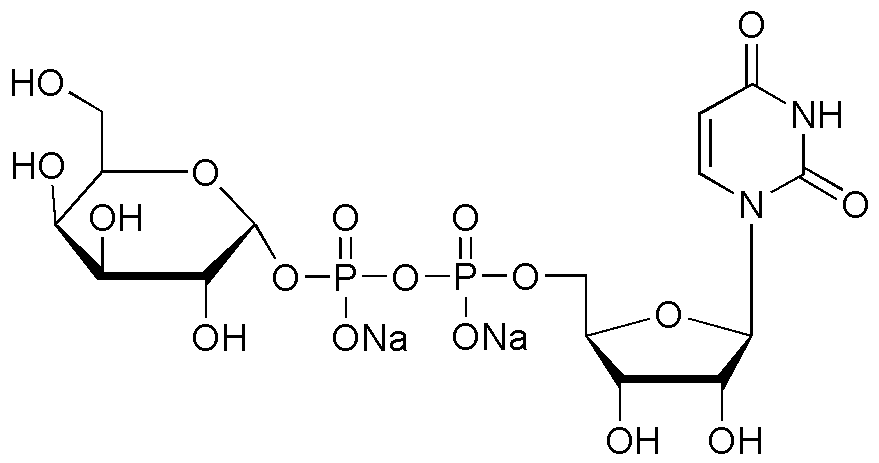Uridine 5'-diphosphogalactose disodium salt is widely utilized in research focused on:
- Biochemical Research: This compound plays a crucial role in studying glycosylation processes, helping researchers understand how sugars attach to proteins and lipids, which is vital for cell signaling and immune responses.
- Pharmaceutical Development: It is used in drug formulation to enhance the bioavailability of certain medications, particularly those targeting neurological disorders, by facilitating better cellular uptake.
- Enzyme Activity Studies: The compound serves as a substrate for various glycosyltransferases, allowing scientists to investigate enzyme kinetics and mechanisms, which can lead to the development of enzyme inhibitors.
- Cell Culture Applications: In cell culture, it supports the growth of specific cell lines by providing essential nucleotide precursors, thus improving experimental outcomes in cellular studies.
- Diagnostics: It is utilized in diagnostic assays to detect specific biomarkers related to galactose metabolism disorders, aiding in early diagnosis and treatment planning.
General Information
Properties
Safety and Regulations
Applications
Uridine 5'-diphosphogalactose disodium salt is widely utilized in research focused on:
- Biochemical Research: This compound plays a crucial role in studying glycosylation processes, helping researchers understand how sugars attach to proteins and lipids, which is vital for cell signaling and immune responses.
- Pharmaceutical Development: It is used in drug formulation to enhance the bioavailability of certain medications, particularly those targeting neurological disorders, by facilitating better cellular uptake.
- Enzyme Activity Studies: The compound serves as a substrate for various glycosyltransferases, allowing scientists to investigate enzyme kinetics and mechanisms, which can lead to the development of enzyme inhibitors.
- Cell Culture Applications: In cell culture, it supports the growth of specific cell lines by providing essential nucleotide precursors, thus improving experimental outcomes in cellular studies.
- Diagnostics: It is utilized in diagnostic assays to detect specific biomarkers related to galactose metabolism disorders, aiding in early diagnosis and treatment planning.
Documents
Safety Data Sheets (SDS)
The SDS provides comprehensive safety information on handling, storage, and disposal of the product.
Product Specification (PS)
The PS provides a comprehensive breakdown of the product’s properties, including chemical composition, physical state, purity, and storage requirements. It also details acceptable quality ranges and the product's intended applications.
Certificates of Analysis (COA)
Search for Certificates of Analysis (COA) by entering the products Lot Number. Lot and Batch Numbers can be found on a product’s label following the words ‘Lot’ or ‘Batch’.
Numéro de catalogue
Numéro de lot/série
Certificates Of Origin (COO)
This COO confirms the country where the product was manufactured, and also details the materials and components used in it and whether it is derived from natural, synthetic, or other specific sources. This certificate may be required for customs, trade, and regulatory compliance.
Numéro de catalogue
Numéro de lot/série
Safety Data Sheets (SDS)
The SDS provides comprehensive safety information on handling, storage, and disposal of the product.
DownloadProduct Specification (PS)
The PS provides a comprehensive breakdown of the product’s properties, including chemical composition, physical state, purity, and storage requirements. It also details acceptable quality ranges and the product's intended applications.
DownloadCertificates of Analysis (COA)
Search for Certificates of Analysis (COA) by entering the products Lot Number. Lot and Batch Numbers can be found on a product’s label following the words ‘Lot’ or ‘Batch’.
Numéro de catalogue
Numéro de lot/série
Certificates Of Origin (COO)
This COO confirms the country where the product was manufactured, and also details the materials and components used in it and whether it is derived from natural, synthetic, or other specific sources. This certificate may be required for customs, trade, and regulatory compliance.


